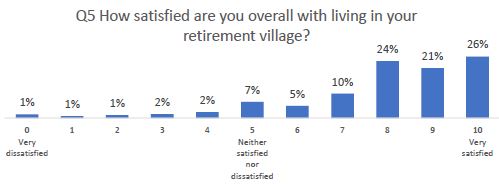Our job at DCM Media is to be an observer, reporter and commentator on the retirement village and aged care sectors.
We have the combined luxury of not being in day-to-day operations, we talk to a vast array of supplies and operators every day, and we do a lot of research.
With this helicopter vision, we see great opportunity for retirement villages and aged care - but threads are forming that have the potential to decimate their business cases.
Don’t get us wrong; demand for retirement villages and aged care services far exceed supply. Both sectors however are missing in action in both servicing those customer needs and capitalising on the opportunity.
Our vision says it all comes down to leadership and commitment. (This week the Royal Commission was saying this as well).
Here are some thought points for you.
Regulation Jeopardy
The picture above is a (combination) slide from a NSW Retirement Village Ambassador Kathryn Greiner presentation eight weeks ago in Dubbo. The messages speak for themselves.
Her report presented in December has resulted in the discussion paper developed without industry consultation proposing six month buybacks in metropolitan and 12 months buybacks in country regions.
This is extremely challenging for the sector financially. The sector has until 16 August to respond.
But NSW has 267 village operators across 563 villages. As we learnt this past week by Earle Haven Retirement Village – the behaviour of one operator can impact all operators when it comes to regulators – unless there is a strong voice to provide balance.
As Kathryn Greiner has said many times: “It’s up to the industry to improve” OR “The sector will be regulated out of existence”.

Earle Haven and 'trust'
Now think about last Thursday and the single entity Earle Haven ‘Retirement Village’, where two private operators allowed money to get between their duty of care for residents.
Yesterday the Founder of the HelpStreet, Kris Bunker, who operated the Earle Haven aged care home for the retirement village operator People Care, made this comment to the media:
"We arrived to urine-soaked mattresses, bedding and towels with holes in them, and food that was described as slop — we turned that around — but we've been constantly underpaid for that good work by People Care."
Money is the issue. Now Earle Haven is destined for the Royal Commission.
Regulators will not miss this message when framing new regulations to ‘protect’ residents, irrespective of the fact it was an aged care home (titled a retirement village).
As discussed, it just takes one village to critically undermine ‘trust’ in the village sector (and aged care sector).
The New Zealanders have close to 100% operator membership of their Retirement Village Association, and with this strength they can deliver the Government on what they call their ‘Social License’. It’s a document and behaviour that offers ‘trust’.
From Earle Haven we have the return of Gerard Brody leading the Consumer Action Law Centre (CALC) of Victoria in the media again questioning ‘trust’ in retirement villages. CALC was a driving force behind the Four Corners expose and campaign to regulate villages.
CALC openly wants the Royal Commission to be expanded to include retirement villages. Who will have a more effective voice – a Victorian Government funded, well organised and media savvy consumer advocacy group or the fragmented village operators?
 Two novice Ministers and the Royal Commission
Two novice Ministers and the Royal Commission
Earle Haven is the first big ‘event’ for two new Government Ministers.
NSW has Kevin Anderson of Tamworth (pictured left); he is ‘learning’ what it is to be Minister for Better Regulation and Innovation (including Consumer Affairs and therefore retirement villages). Earle Haven just made it a lot harder for him to listen to ‘business’ about easing up on regulations (i.e. buybacks)
Federally, Senator Richard Colbeck (pictured right) is the new Federal Minister for Ageing. His first introduction to retirement villages, again, will be two operators fighting over money with duty of care a secondary factor (at best).
Senator Colbeck will be keen to ‘do something’ out of Earle Haven and the Royal Commission is in his portfolio. Inclusion of the village sector is an easy step.
What will it say to consumers about ‘trust’ if the village sector is ‘dragged’ in to the Royal Commission?
And what about the Royal Commission?
When the spotlight is shone even briefly on the aged care sector (many of the operators who also operate retirement villages), the vision to the common man and woman is not complimentary.
Leadership
In the past weeks we have seen big private aged care operators being openly questioned if money and self-importance was more important than resident welfare (arguably very unfairly questioned).
We have reputable Not for Profit operators with big boards that had no understanding or oversight of the clinical care they were responsible for delivering.
We have operators that elected to not provide information to the Commission that was damaging to their cause, or changing data and dates.
All of this goes to ‘trust’ again in the people who say they can and will look after older Australians.
Will this be what the Commissioners will be saying in their two reports to be handed to the government, the first due in September?
It all supports the media being able to say ‘I told you so’ and regulators to say ‘we will regulate to protect residents (from operators)’.

As Lauren Broomham has been highlighting in The Daily COMMISSION, the very astute Counsels Assisting (Peter Rozen QC pictured) are leading the Commissioners by their selection of witnesses and questioning to a finely tuned plan which they clearly know the destination and it will not be attractive. Leadership will unquestionably be the target, and ‘trust’.
The Royal Commission will run through to April next year.
What is missing from this village discussion?
Simple. The good news.
Why do 24,000 sensible older Australians buy into a retirement village every year – that is 92 real people every day of the week, 365 days a year, with most ‘sold’ on the recommendation of village residents?
Why is there a village in 2,000 communities across Australia – that is one in nearly every suburb and town?

Why do villages achieve a ‘satisfied’ or better rating by 93% of all residents (19,600 residents surveyed independently across 520 villages in Jan 2017)?
Because villages deliver physical, financial and emotional security.
Most important in today’s world, villages overcome isolation for the elderly. This is unique in its value.
What is missing from the aged care home discussion?
Simple again. The good news.
We have 200,000 ageing, frail people in aged care homes advancing towards death, with high medical demands and dementia.
Their families can no longer manage their care and ask operators to take over - or they have no family to support them in this final journey.
Residents are looked after 24/7 by over 250,000 facility staff, who take over from ‘family’ and society.
An actuary would say the actual number of ‘reportable incidents’ is extremely low based on the sheer numbers and opportunities for mishaps and human actions and reactions.
With more cash, more can be done. But the Government controls the cash.
Sector leadership again is required to take the mature discussion to the Government and the people.
To this we should note that the Commissioners are increasingly blunt, and cynical, asking aged care operators where are their proactive submissions for the future of Australia’s aged care?
The answer, nearly every operator we have spoken to states they want to be a small target – which makes it hard to be making proactive submissions.
Summary
Our helicopter view tells us that the winds of change are approaching an intensity that a perfect storm will soon be upon both sectors.
The community will have totally lost trust, regulators will increase the pressure on operations, increasing numbers of customers will find other solutions, quality staff will find more optimistic sectors to work in and occupancy will shrink to below marginal levels.
Individual operators must abandon complacency and ‘steady as she goes’, and actively engage in the sectors’ future direction.
Otherwise, as Kathryn Greiner says, for each sector, it will “be a good idea whose time is over”.
Postscript One
In my own career journey I have worked in industries already decimated, such as:
- The recording industry, now vastly diminished
- The advertising industry, now vastly diminished
- The graphic design industry, now vastly diminished
- The printing industry, now vastly diminished
- The magazine industry, now vastly diminished
It does happen and faster than you realise. The survivors in each led with radical change, in partnership with their customers. Are we up for it in villages and aged care?
Postscript Two

I commend to you to watch the 10 minute piece by Stephen Bull, the past CEO of Stockland Retirement at our LEADERS SUMMIT on his three big challenges he worries about for the village sector; they are the same for the aged care sector.
Watch the video HERE.
Postscript Three

Chief Political Correspondent David Crowe was reporting on the review of APRA in policing banks and superannuation funds after the revelations of their Royal Commission.
APRA was identified as ‘soft’ in its regulatory oversight – just as CALC may argue about the regulators of the retirement village sector with the Royal Commissioners and the Counsels Assisting will likely argue about the auditors and quality assessors in aged care.
David Crowe opened the article with:
The nation’s banks and superannuation funds will face tough new controls including extraordinary powers to veto top executives after a review of the peak financial regulator slammed its “culture of conformity”.
The findings clear the way for drastic new laws and a more “assertive” approach to regulating banks, insurance companies and super funds after a string of scandals which inflicted serious harm on consumers.
In a scathing report, the government’s long-awaited inquiry into the Australian Prudential Regulation Authority found it was slow to act, reluctant to change and lacking the “enforcement appetite” needed to take on big companies.
Crowe later in the article reported:
(The Treasurer) Mr Frydenberg will issue the Samuel report and his response on Wednesday with a commitment to give APRA “sufficient powers” to stop “inappropriate” directors gaining office.
“The government is determined to continue to strengthen the oversight and efficiency of the superannuation system,” he said in a statement.
(The Federal Government now spends $18B on aged care – approaching 1% of GDP. Out of the Royal Commission will it want more say in how its money is spent and the qualities of the people spending it)?
Consumer groups have savaged APRA in recent years for failing to stop misconduct including the charging of “fees for no service” at a cost to customers of more than $1 billion.
(Customers now contribute 30% of the cost of aged care; do they get a fair say and value from this investment)?
(And does this sound like a discussion on the DMF)?
Prime Minister Scott Morrison set up the Banking Executive Accountability Regime early last year with powers to impose fines, disqualify individuals and intervene in executive pay policies across the finance sector.
(Scott Morrison named ‘aged care’ as one of his top three priorities the day after winning the election. Will he do the same for the aged care sector?).
(The report on APRA recommends) It also calls for a more “active and forceful approach” by the regulator to take on companies in public.
“APRA needs to shift the dial towards a more strategic and forceful use of communication to ensure that it maximises its impact with regulated entities,” it said.
Is this a timely message to both the retirement village and aged care sector?










